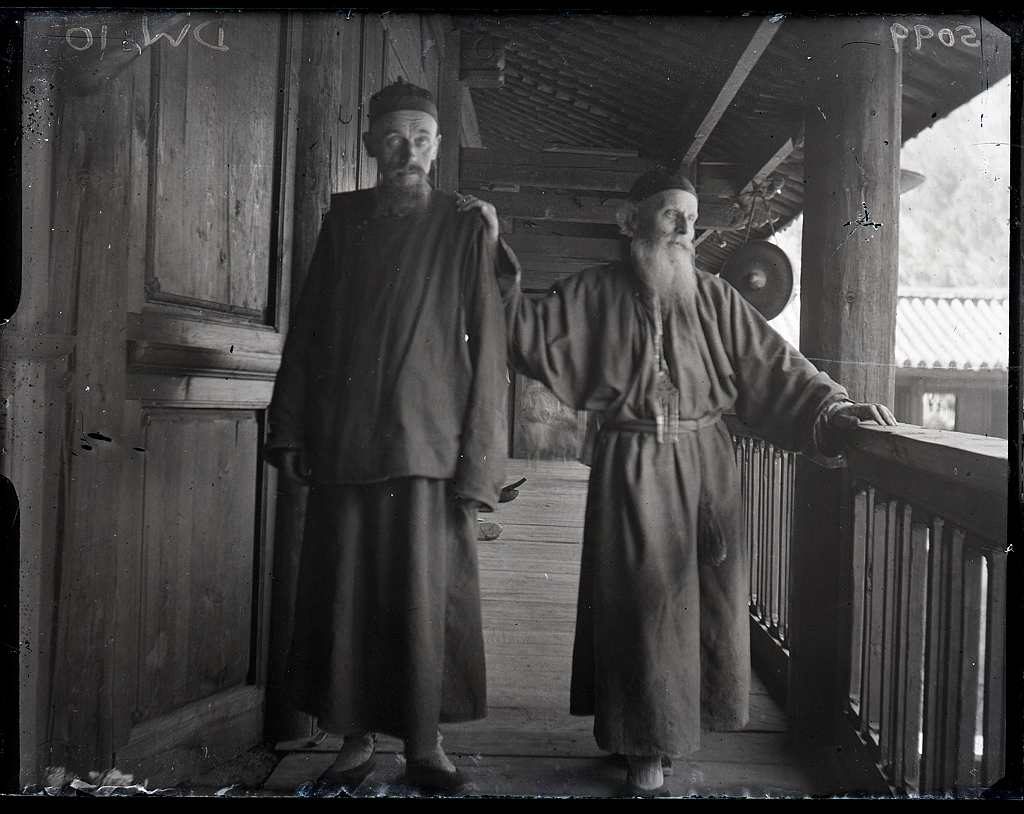Some of us may be lucky, or in this case, unlucky enough to experience a life altering event that comes to define us whether we want it to or not. For the plant collector George Forrest, it was what happened to him whilst working in the valleys of the Mekong river in south-central China in July 1905. It is hard to talk about Forrest without mentioning it and it earned him the reputation of being resourceful and determined.
Forrest, who had been a herbarium clerk at RBGE, was, from April 1904, on his first plant hunting expedition to Yunnan province, southwest China on behalf of A.K. Bulley of Bees Nursery and founder of Ness Botanic Gardens near Liverpool. In 1905 he concentrated his search in the valleys near the Mekong river, and all seemed to be going well until news reached home that Forrest had been murdered. His shocking death was mourned for a few days before a telegram arrived announcing him ‘alive and safe’. A few months later, the following letter addressed to Isaac Bayley Balfour, the Regius Keeper at RBGE arrived, and Forrest told his tale – I’ll leave him to tell you now what happened, in his own words… [though words in square brackets are my additions, and it should be borne in mind that understandably this is a one-sided version of what happened. Warning: some of the content of this letter is distressing.]
The Consulate,
Teng-Yueh [Tengchong],
S.W. China,
1st October 1905Prof. I.B. Balfour, M.D.,
‘Regius Keeper’,
Royal Botanic Garden,
Edinburgh,
Scotland.Dear Sir,
To begin this letter in such a way as to enable you to follow the course of events, I must take you back to the date of my last letter from Tsekou [Cigu], the 13th July. As you may remember, I mentioned then that we had just received word that the lamas of Honpou, a place situated about a day’s march north-east of Tsekou, on the Mekong-Yangtze Divide had called out their adherents, Tibetan farmers and hunters. The number of lamas in this gomba or lamaserie [sic] is comparatively small, only 100, but as their influence extends over a considerable tract of country, they are thus enabled to collect quite a number of men.
Unfortunately, we, the Fathers and myself, did not attach the importance to this report we ought to have done. In the face of so many conflicting rumours, at all times we had found it a difficult matter to sift the false from that which was authentic. If we had taken seriously all that we heard, Tsekou would have been vacated long ere it was. The only result of the above news was the doubling of our sentries at the ropes and up the river.
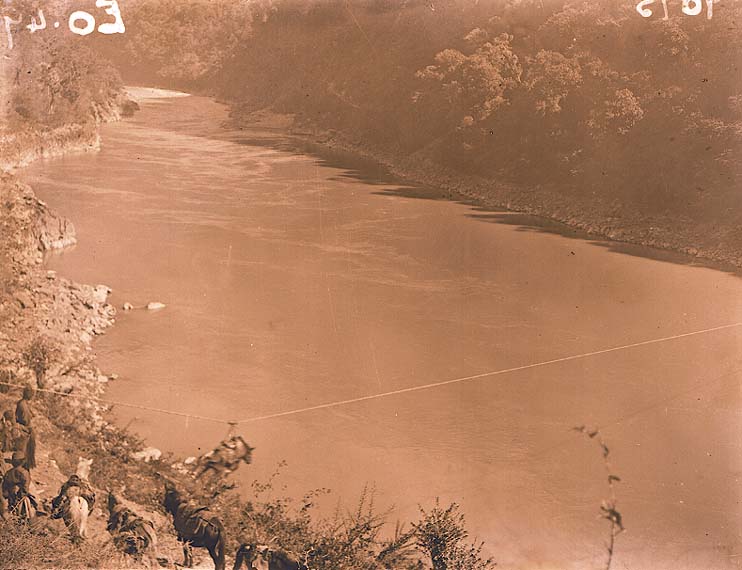
The day following this, the Besse [headman or chief] of Sujong, or Tsedjrong as the Tibetans call it, who all along had apparently been our friend, came down with the news that 600 additional soldiers were on their way up the river from Wei Hsi [Weixi]; also that 1,800 more had left Lichiang-fu and were marching up the Yangtze valley; that both bodies were on their way to relieve Atuntze [Deqen], which was still holding out, and was likely to do so until relieved. He showed us letters to that effect.
This eased our minds greatly as we knew that, so long as Atuntze held firm, we were safe, the lamas and natives not daring to act on the aggressive so long as Chinese troops were to the north of them.
You can perhaps understand what an anxious time this was for me. For weeks back I had been trying to get men to take the plants, seeds and butterflies I had collected, [along] with some of the rest of my baggage, down the river to a place of safety, but without success. As I have already told you in one of my recent letters, the inhabitants of the district were divided into two sets, the lama faction, who would have cut our throats and burnt Tsekou with the greatest of pleasure, and another, who, though favouring the mission, were too intimidated to assist us openly in any way. I determined to hang on ‘till the very last in the hope of getting my stuff away, as I knew if I did go then, I would have to go empty-handed. Besides all this, after having been so hospitably treated by Père Dubernard, I could not possibly run away at the first intimation of danger, and leave him and Père Bourdonnec, two old men, to bear the brunt.
However, affairs reached a head on the 17th of July. At 2 o’clock on the morning of that day, I was awakened by Père Dubernard coming to my room with the news that Atuntze had been surrounded and was likely to fall at any moment; that the Besse of Tsedjrong had all along been acting the traitor towards us, bringing favourable reports on the situation, merely that we might have a false sense of security and thus remain in Tsekou. Some say that he had even gone the length of capturing and murdering our runners on their way down from Atuntze, but for the truth of this I cannot vouch. Père Dubernard said that all that was now left to us was safety in flight, and you can easily imagine it was with a very heavy heart I set about making preparations. It simply maddened me to see my plants and seeds lying around, with the knowledge that I had to lose them all.
Père Dubernard had led me to understand that we would leave Tsekou at daybreak, and I am certain that this was really his intention, and that he would have done so had it not been for Père Bourdonnec’s influence. Had we fled then, both would probably have been alive today. As it was, Père Bourdonnec talked a lot of balderdash, about remaining to make a fight of it in defence of the Christians, and thus won over Père Dubernard. From my knowledge of the after actions of the man, I thoroughly believe that at the time, his brain had given way to the continued strain, although we saw no signs of it other than intense excitement. As I knew very little French, and they no English, I could not follow the drift of their conversation very well, but as daylight approached and I saw no signs of preparation for departure, I got on to both of them, and asked them, rather brusquely, when they intended starting. Both of them then said that they had decided to remain and fight. I know I will be censured in certain quarters for my conduct, and I can assure you I have suffered terribly since for my quixotic folly, but, on hearing their decision, I also decided to remain. Possibly I was influenced by the extreme state of grief and agitation in which Père Dubernard was. He had been most kind to me, and a very close friendship had sprung up between us, which would, I think, have proved lasting, had he not come to such a sad and untimely end. Besides, by hanging on, there was always the hope that we might be undisturbed.
The 18th and part of the 19th we spent in great anxiety. Reports were being continually brought in by natives, and our hopes were one moment raised, only to be dashed the next to the ground.
However, about 5 o’clock on the afternoon of the 19th, the crisis was reached. One of our runners arrived then from Atuntze with the news that the town had been captured, and that even then the lamas were on their way down the river to raid Tsekou. In a moment after this all was confusion. As I had suspected, when it came to the point, no-one showed the slightest inclination to remain and fight, Père Bourdonnec least of any, although, for the two preceding days he had been making all sorts of preparations.
By large offers of silver I managed to get some of my servants to promise to carry some of my specimens and seeds, my papers, letters and notes. These were all abandoned when the lamas attacked us.
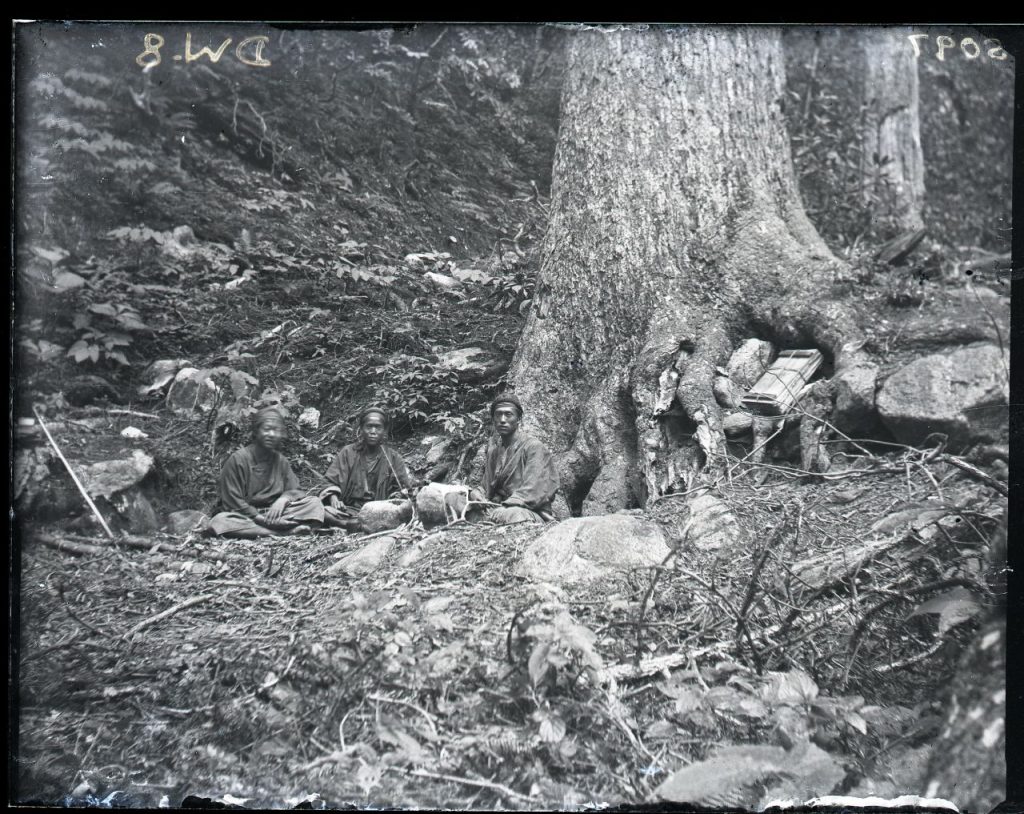
around 10 miles northwest of Tsekou, on the eastern flank of the
Mekong-Salwin divide in the Mekong valley. July 1905
We had everything prepared for flight in about two hours, and finally left Tsekou about 7:30 p.m., just before the moon arose. Père Bourdonnec and Père Dubernard were mounted, I was walking and all of us were heavily armed, as well as many of the Christian Tibetans who accompanied us. Our progress was slow, as the path was difficult and dangerous, being only a track of 1-2ft in breadth, running along the right bank of the Mekong at various heights above the river, where, at many points, the slightest slip meant serious injury or death.
By about 9pm we had reached Patong [Badong], and although the village seemed steeped in slumber, we had not gone half a mile farther before the signal, a peculiar Tibetan cry, had gone across the river intimating our flight. From that moment we were in deadly danger, as we knew the Honpou lamas were somewhere on the other side, and might, at any moment cross the ropes at Bati [Badi] and cut off our retreat.
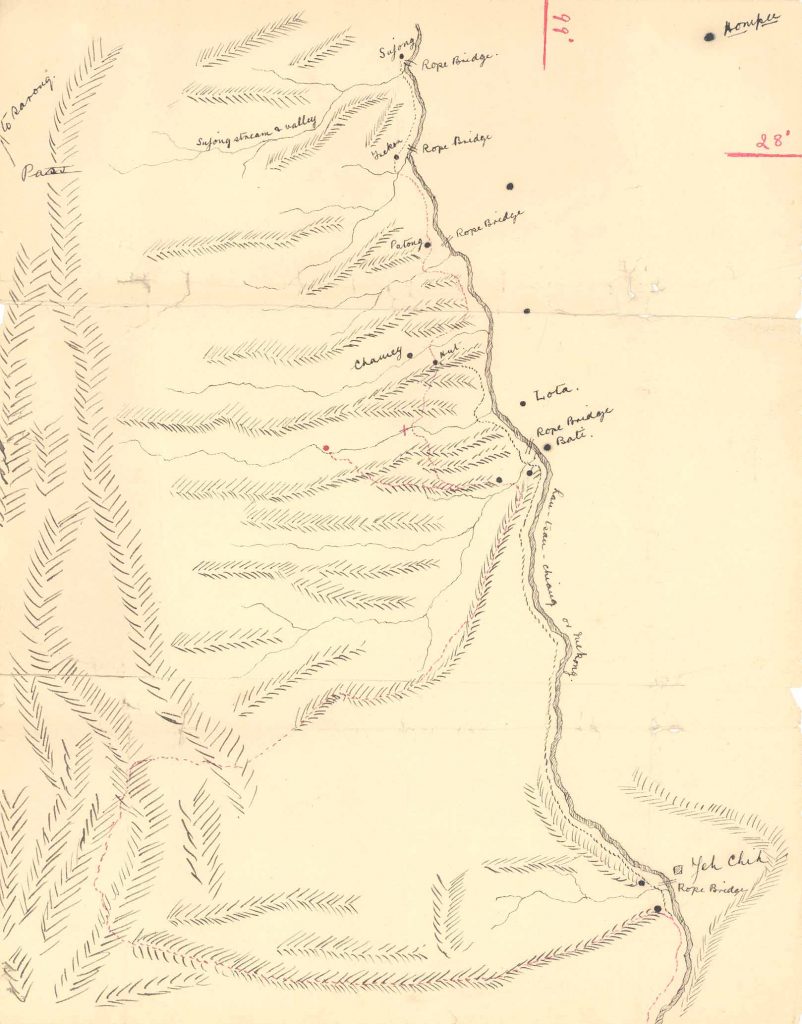
By midnight we entered and crossed the Chamey valley, a little to the east of the village of that name. After ascending about 400ft, on the south side of the valley, we took refuge in the hut of a Christian, to have a rest and a cup of tea.
This was agreed on entirely against my advice, Père Dubernard being again influenced by Bourdonnec. I was all for going ahead so long as the darkness lasted, but Père Bourdonnec had recovered somewhat from the funk he was in when we left Tsekou, and seemed to think the lamas would be some time in taking up the pursuit. Very reluctantly I agreed to do as he wished, and you will see before you finish reading this, that, had my advice been taken, many valuable lives might have been saved. Had we pushed on we would have reached the rope bridge at Yeh-Chih [Yezhi] in 10 or 12 hours.
Unfortunately we had not been in this hut any length of time before the Besse of Chamey got to hear of our arrival, and came up to see us. On Père Dubernard questioning him regarding the condition of affairs south of where we were, he robbed us of our remaining hope by saying that most of the people were standing in with the lamas, and assured us that if we went by the ordinary route down the river, of a certainty we would be captured and killed. However he offered to procure guides for us as soon as daylight broke, and these, he said, would take us by a round about mountain path down the range at some distance from the river, and outside the dangerous zone, until we reached the Mekong opposite Yeh-Chih.
From the first I was suspicious of this man, for one reason, because he was half drunk, and again I objected strongly to the arrangement, but in spite of all I said, could not gain over Père Dubernard. Père Bourdonnec was beyond speaking to by this time, having completely collapsed on hearing the news brought by the Besse. I have never seen a man in such a state of terror before or since. He was completely paralysed, and from that time forward we could do nothing with him. Père Dubernard also seemed to give up hope then, and at this point I felt strongly inclined to leave them to their own devices, and travel alone.
Whilst all this was taking place time was flying, daylight broke, the sun rose, hour after hour passed and yet no move was made to start, and this enraged me when I knew that every moment was precious. I was now certain that the Besse was fooling us, and that he was in conjunction with the lamas, otherwise, for his own sake, if not for ours, he would have hastened our departure. It was nearly 10 o’clock before the guides were procured, and fully that time before we proceeded on our journey.
Leaving the hut, we struck off at nearly right angles to the main track, and continued the ascent of the south side of the Chamey valley. We gained the summit about two hours later, and a sight greeted us which increased our fears tenfold. About 10 miles to the northward we could see a large column of smoke ascending, and realized that Tzekou had been burned, and that probably the lamas were already pursuing us. Here I made my last attempt to hasten the movements of the Fathers, but without avail. Both seemed to have entirely given up hope. When I saw my efforts were useless I pushed on ahead with one of my servants, Anton by name, and commenced the descent into the next valley. About 1pm we reached the bottom of the gully, and crossed the stream which ran through it by a fallen tree which formed a natural bridge. The breadth of water at this point was about 60ft by 7-10ft in depth. The current was very strong, as is the case with all the tributaries of the Mekong. The Fathers were some distance behind me, and on reaching the edge of the stream camped for tiffin instead of hurrying on as they ought to have done. Under the circumstances I was disinclined for food, so, whilst the others were lunching, I took up a position on an elevation on the south side of the stream, where I had a clear view of the path we had traversed in crossing the ridge from Chamey.
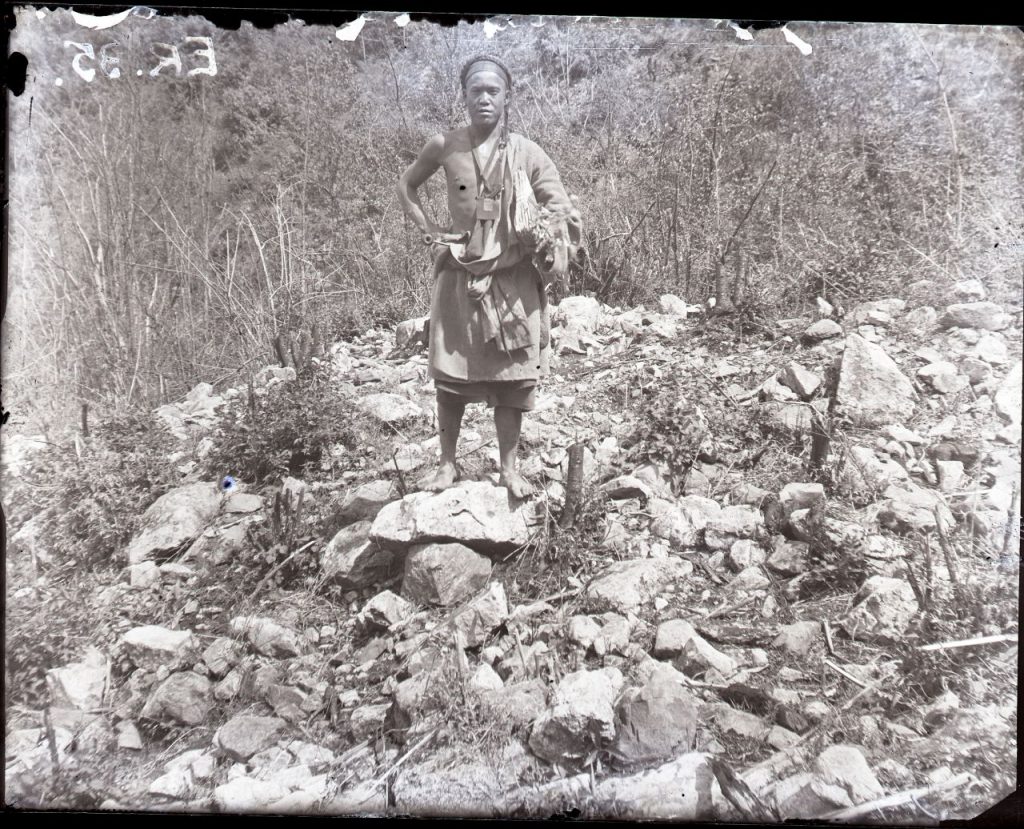
In a short time I saw what I had expected, a band of 40 or 50 men come tearing along the ridge full speed, and immediately gave the alarm. Even then I was not believed, until some of our men, who had been lagging behind, came rushing in with the news that the lamas of Patong and Honpou were just behind them.
Immediately all was confusion, and from that moment forward, it was every man for himself. The last I saw of Père Dubernard he was flying up stream towards the main range, Père Bourdonnec fled straight up hill south of the stream. My men wished me to do likewise, but as I felt almost certain the way would be blocked. I chose to go down stream towards the Mekong, which lay about 2 miles to the east. That frightful race I shall never forget, and how I escaped death I cannot say. The path was in most places formed of brackets in the faces of cliffs, scores of feet above the stream which thundered beneath. At those parts it consisted merely of two eight inch logs, slippery and rotten from the continual moisture and spray. Yet over these I went racing as if I had been on an ordinary good road. Towards the end of the valley, which was shut in by precipitous cliffs at its junction with the Mekong, the path took a sharp bend, and as I turned round this, I came face to face with seven lamas and Tibetan soldiers, all armed to the teeth. They were about [???] yards distant and instantly spotted me and gave chase. I was in despair then, and made sure I would be captured or killed, I thought of making a stand, and could quite easily have shot the whole of them down, with my rifle, a [15???] shot repeating Winchester, before they could have covered that distance, but I feared there would be others behind, and in that case the slightest delay meant being caught in a regular trap, as the path was along the face of a cliff. Therefore I turned and fled in the direction I had come, then, before they had reached the corner, I made a jump into the scrub on the stream side of the path, continued my descent for a few hundreds of feet until I reached a suitable place for making a stand, got my cartridge belts off and placed ready to hand, and then awaited further developments. I heard them rush past on the path above, but they could not find my tracks, and I suppose they therefore made sure that I had taken to the ridge and was going south. This I had calculated on, and therefore had gone in directly the opposite direction.
I lay in hiding until evening, and then when the moon had risen, gained the path again, and commenced the ascent of the ridge which formed the southern boundary of the gully. Here it was about 2000ft in height, and very steep, almost precipitous in parts. I had to go so warily and the footing was so precarious that it took me nearly five hours to gain the summit, and I reached it only to be doomed to disappointment, because I found the lamas had placed a line of sentries along the crest, and had thus blocked all attempts of the fugitives to go south. Their camp fires extended as far as I could see, therefore there was nothing to be done but retrace my footsteps. This I did, reaching the foot of the gully just as dawn was breaking. The day I spent hiding in a hollow under a rock. The second evening before dark I went back on my old track a short distance, and discovered that my pursuers had been following me by the marks made by my boots. Those I immediately discarded, buried, then descended to the stream, entered the water and waded up west for nearly a mile, taking the utmost care when I got out to leave no track. To this, I think, I owe my escape, as I am sure, had I gone on as I did the first night, they would almost certainly have run me to earth. This journey occupied the whole of the second night.
The third night I again ascended the ridge at a point farther west, but found the sentries still blocking the way south. During my descent towards the stream in the early morning, I found a score or so of ears of wheat which had been dropped by someone, probably one of the fugitives. These, eked out from day to day, was all the food I had for eight days. During that period my days were spent in hiding, and my nights in trying to break through the cordon formed to the south of me. Nearly all the time it rained heavily, and how I escaped fever I cannot tell. Several times I saw detached bodies of lamas, and could, a few times, have shot them down, but refrained from doing so, as I knew that by firing a shot I would have brought hundreds down on me. Once, whilst lying asleep behind a log in the bed of a stream, I was awakened by a sound of laughing and talking, and on looking up I discovered thirty of them in the act of crossing the stream about fifty yards above my hiding place. It was a very near squeak.
By the end of eight days I must have presented a most hideous spectacle, clothes hanging in rags, and covered in mud, almost minus breeches, face and hands scarred and scratched with fighting my way through scrub in the dark, feet ditto, and swollen almost beyond the semblance of feet, shaggy black beard and moustache, and, I have no doubt, a most terrified, hungry and hunted expression on my countenance. Altogether my appearance must have unique, and, I should like very much to have had the ‘giftie’ Burns talked of. [to see oursels as ithers see us]
As I have already told you, by the end of the eighth day I was so exhausted by hunger, in fact so weak that I could hardly stand, that I decided on risking everything, and going down to a village for food. In any case it was death if I did not do this, either by starvation or at the hands of the lamas.
Therefore on the evening of the eighth day, I made my way up stream, west, until I came to a small Lissoo village, consisting of only four huts, marched into one of them, and then had only strength to murmur the one word ‘tsampa’ before I collapsed. Fortunately I had fallen amongst friends. The people immediately cooked some tsampa cakes (simply dough boiled in water) and, although I knew it was dangerous, foolishly I gorged myself on those. I was so hungry I could not resist the temptation. Two hours afterwards I was suffering the tortures of hell. I brought on catarrh of the stomach and bowels, and from thence forward, suffered severely after every meal; even yet I am not right. Have had diarrhoea more or less for over two months.
With those people I remained three or four days, until they had arranged with the Besse of one of the friendly villages on the Mekong for my farther journey south. These arrangements having finally been made, we started out on the morning of the fourth day. I had two Lissoo, the head man and his brother, as guides. Late in the afternoon, as we were approaching the village mentioned, we were met by the Besse, who informed us that we would have to go into hiding for the remainder of the day, as thirty lamas had arrived at, and were camped in, his village. He promised to return after dark, to let us know if the road was clear. We ensconced ourselves in a pine wood, and there patiently awaited his arrival. He returned about 9pm and told us the lamas were still at his place, and that our best plan was to spend the night in a Lissoo farmer’s hut, which was about a mile distant, and then in the morning, strike right into the heart of the mountains, and thus make our way to Yeh Chih. He explained he couldn’t come with me himself, but he had brought a couple of guides to accompany me. It was so dark we had great difficulty in finding the hut, then next morning we left early, striking almost due west up one of the side ridges or spurs and thus made our way to the summit or back-bone of the Mekong-Salwen [sic] divide. Most of the time we had to cut our way through rhododendron and cane brake, and then, when we reached the summit of the range, had two days frightful travelling at an elevation of from 14,000 to 17,000ft over snow, ice, and wind-swept tip-tilted strata, which literally cut my feet to pieces and shreds and even played havoc with the hardened hoofs of my guides. Bitterly cold it was, sleeping out at such an elevation without covering of any sort. One night it rained so heavily that we had no fire, and had to content ourselves with only a very small quantity of rain water caught in a piece of pine bark. How I scraped through all the hardships I cannot tell. Under more congenial circumstances I should have thoroughly enjoyed the journey. The flowers I saw were really magnificent, in fact, so fine were they, that I have decided to run the risk of going back next year if Mr Bulley gives his consent to the arrangement. There was several species of Meconopsis, all of them surpassingly lovely, acres of primulas, of which I noted nearly a dozen species in flower, ditto rhododendrons, many of which I had never seen before, and which may probably be new species, besides numberless other flowers. Those mountains have, rightly in my opinion, been termed the flower garden of the world. However I had no time to waste on them then, and beyond collecting a few scraps of those which I took to be the most uncommon, and transferring them to my pocket book, I could do nothing.
On the morning of the fourth day, we turned due east, again following one of the ridges, and started our descent towards the Mekong. All day it rained heavily. We reached the end of the spur overlooking the Mekong directly opposite Yeh Chih about 4pm and I found quarters in a house situated there.
That evening the Besse of Lichiang-fu, who was camped with a number of men blocking the river … to the north of this point, visited me, bringing a supply of food, Chinese cakes, pork, chicken, eggs, arrack, etc., besides a blanket for my use.
Next day the Besse of Yeh Chih visited me. I cannot say too much in praise of this man’s kindness. All along he has proved a friend of the Tsekou mission, visiting them, and standing by them, in many instances greatly to his own loss. It was from him I received the news of the murder of Père Dubernard and Père Bourdonnec, and he was moved to tears whilst giving me the details of their deaths.
From what he said it appears that Père Bourdonnec was cornered some time during the second day, shot down, and whilst still alive, cut open and his heart torn out. Père Dubernard managed to elude his pursuers until the fourth or fifth day, when he was captured. The lamas broke both his arms, above and below the elbows, tied his hands behind his back, and then led him off in the direction of Tsekou. However he became so exhausted, that he begged them to kill him at once, on which one of them struck him down with a sword. He was then cut open, and his heart extracted before death. Both bodies were beheaded, and all the parts carried north. Had I been captured I should have been similarly treated.
I spent two days in this hut. The Besse sent me food, and what I stood much in need of, a change of clothing, Chinese of course. In any case I should have had to change into Chinese garb, so as to get down the river in safety. Some of the lamas south of Yeh Chih were in rebellion. I also had my beard shaved off.
From the time I went down to the Lissoo village in search of food I had existed solely on Tsampa and Tibetan tea. The mode of preparation is this. The tea is infused, then a small piece of fat or butter and a pinch of salt is added, and the infusion is churned until it presents a milky appearance. Some Tsampa is then placed in a small bowl, part of the liquid poured over it, and the whole worked into a stiff dough. It is then eaten in this state with a portion of the tea as a beverage. Tsampa is Tibetan wheat, partially roasted and coarsely ground. It plays awful havoc with the ‘innards’ of anyone unaccustomed to it, and it very nearly did for me, especially on the top of such a long starve.
On the morning of the third day, having procured guides from the Besse of Yeh Chih, I continued my journey down the right bank of the Mekong. Generally it takes two days to reach Hsia Wei Hsi [Xiaoweixi], but, exhausted as I was I pushed on, and arrived opposite the mission by midday of the second day. The river at this point is very broad, and it was only by repeatedly firing my rifle, that I could call the attention of the villagers, and of the soldiers who were camped there. On the sound of firing they rushed out to the river bank, and then by signs I got them to understand that I wished to cross the rope bridge, which was situated a mile farther down stream. Amongst the crowd I saw one of the Fathers but could not distinguish which it was. It proved to be Père Monbeig, who, at the time, Tsekou was raided, by good luck, had been over on a visit to the hou-tsi-kiang or Salwen [sic] valley branch of the mission. On hearing that Tsekou had been destroyed, he had started for Hsia Wei Hsi by way of the Awa valley pass, and, although he had had nothing but the ordinary rough trekking to endure, well fed, booted, etc., as he ??? had broken down, and had had to rest ??? on the way. This explained his presence at Hsia Wei Hsi, which he had reached only the previous day.
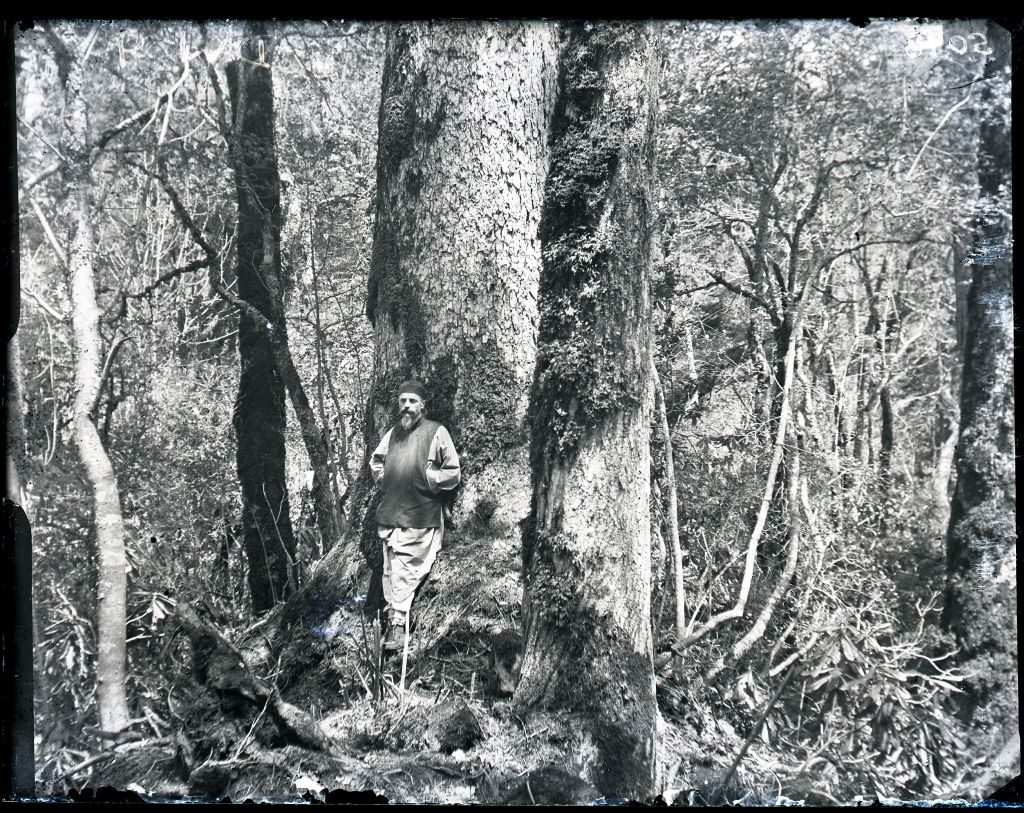
When I arrived at the rope bridge, a single one, the people wouldn’t come across to my assistance until they understood that I was a European. Père Monbeig had understood that I was dead, and, because of my Chinese dress, had not recognised me. However, once they discovered who I was, there was general rejoicing and offers of assistance from everyone. By Père Monbeig I was received as one returned from the dead.
The whole of next day was spent resting and the following morning, having an escort of 20 soldiers, part of the body of men who were stationed at Hsia Wei Hsi, we left for Wei Hsi. About 12 o’clock of that day, we were met by 60 or 70 soldiers sent out by the Lichiang-fu [Lijiang] official, who was in charge at Wei Hsi, as an escort. We reached that place about midday of the second day, and were met by a regular procession of soldiers a short distance from the town. These escorted us to our lodging.
We spent another day at Wei Hsi, had breakfast with the mandarin, and after having suitably awarded our guides who returned from Wei Hsi to their homes in the north, left en route for Talifu on the 13th August, 25 days from the date of the destruction of Tsekou. We had an escort of 20 soldiers. Père Monbeig broke down again, two days out from Wei Hsi and this delayed us two more days. From this point to Tali we travelled in chairs, reaching that city on the 25th August. The missionaries came out a good few miles to meet us, and I was congratulated most heartily on my wonderful escape.
We were most hospitably treated by the mandarin. He offered 1,000 Taels = £125, but we fought shy of that only accepting 100 Taels. Besides this he gave us mules, food and clothing. I was quite richly and gaily attired in a gown of light blue flowered silk, thick blue cloth jacket, lined silk and Chinese trousers of the same material. Blue shoes, white socks, and a black satin cap with a red silk button, completed my costume.
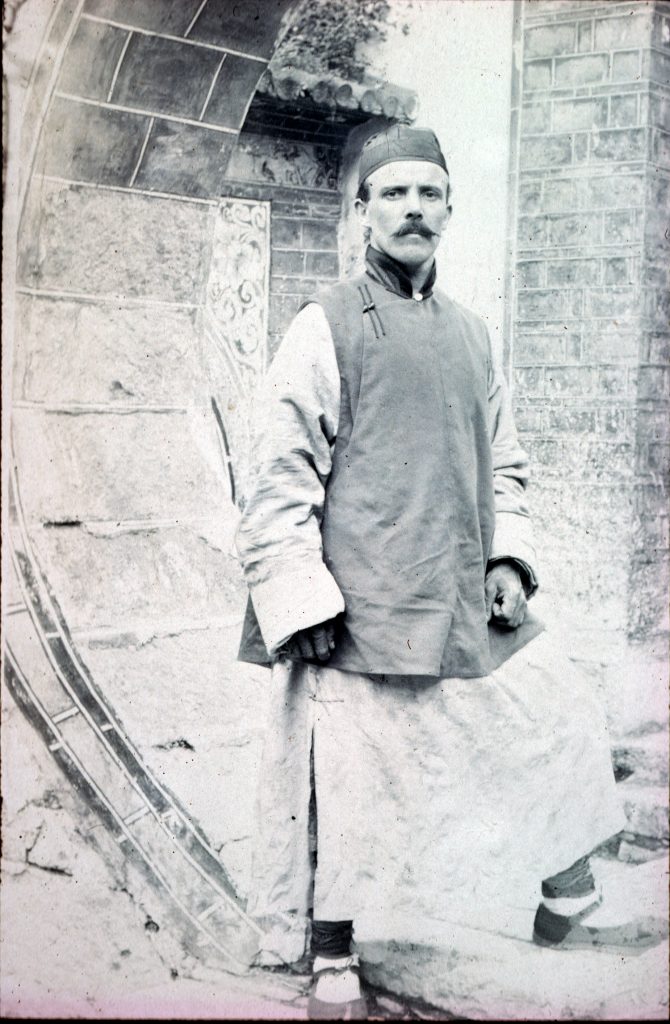
Pray excuse me writing more at present. I am very busy. I may write again before Mr Litton and I leave for the north. In any case you will find enough to bore you here.
With kindest regards,
Yours very sincerely,
George ForrestGB 235 FRG/1/1/1/1905/53 : https://atom-2.rbge.org.uk/index.php/letter-from-george-forrest-tengyueh-to-isaac-bayley-balfour


